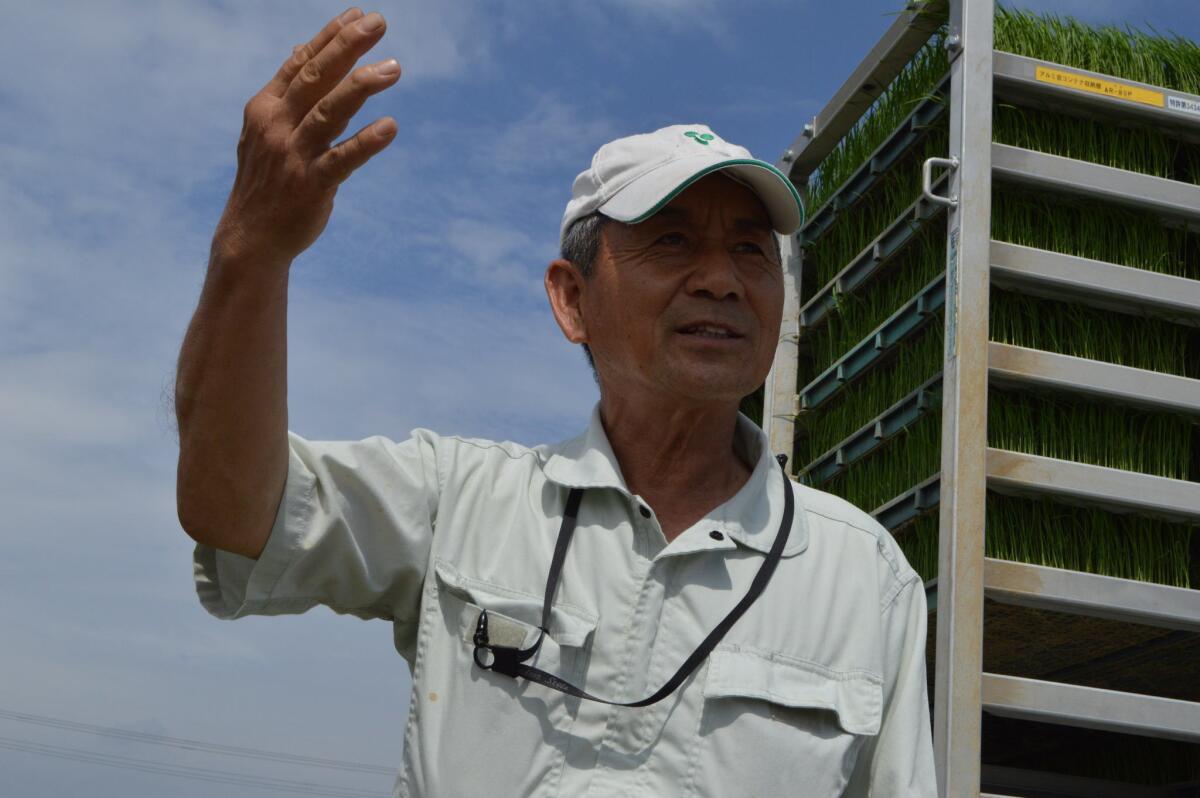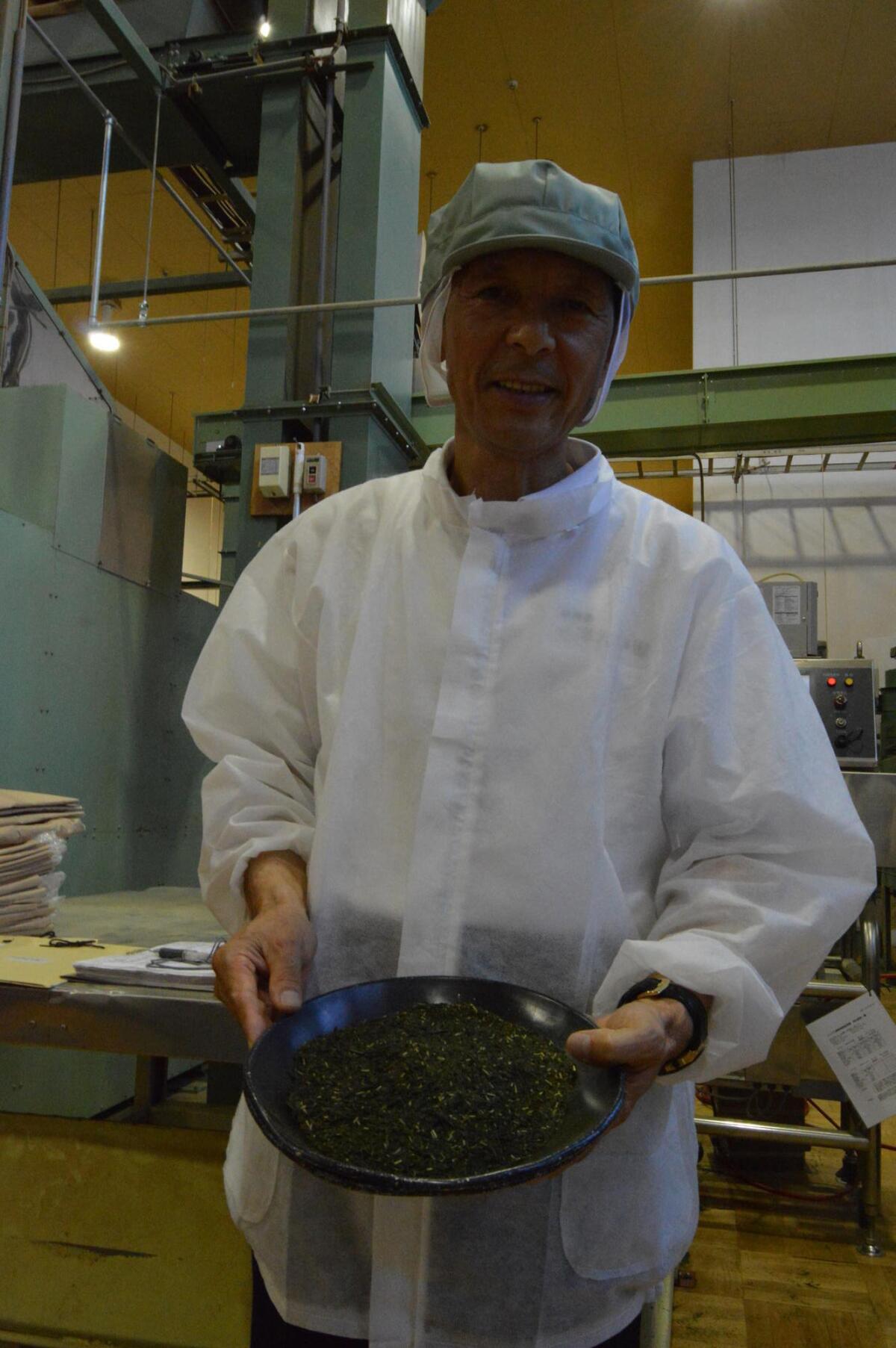No TPP trade deal? Some Japanese farmers say all the better for them

- Share via
Rice farmer Takao Terada isn’t following the U.S. presidential election too closely. But there’s one issue that both Donald Trump and Hillary Clinton seem to agree on — that the U.S. should not ratify the Trans-Pacific Partnership trade pact — and that’s music to his ears.
“We Japanese farmers can’t compete with the Americans. It costs us almost three times as much to produce rice,” he said on Thursday, watching one of his eight workers sowing seedlings in a wet paddy here in Shizuoka prefecture, a two-hour train ride southwest of Tokyo. “TPP will drive down prices and allow in more imports, and that will be a big problem.”
The Obama administration has said the trade pact — which would bind together the American and Japanese economies with Australia, Mexico and eight other countries — would eliminate more than 18,000 tariffs on made-in-America products and “make sure our farmers, ranchers, manufacturers, and small businesses can compete — and win — in some of the fastest-growing markets in the world.”
But Trump has called the trade pact a “horrible deal” that will “send America’s remaining auto jobs to Japan.” Clinton, meanwhile, shifted her stance last fall, under pressure from Bernie Sanders’ campaign and unions, and she said she wasn’t sure that TPP as written would create jobs, raise wages or improve national security.
That kind of rhetoric has cast a long shadow over the TPP, which took seven years to negotiate and is the biggest regional trade pact ever attempted, uniting countries accounting for 40% of global GDP. Partners including Japan are watching closely to see whether the U.S. will press ahead with the pact despite increasing political headwinds.
California vintners, orchard owners and ranchers are among those who stand to benefit, according to the U.S. Trade Representative, because TPP would eliminate Japan’s tariffs on American wines, modestly increase Tokyo’s import quota on rice and eliminate taxes on produce including grapes, avocados, strawberries, kiwifruit, watermelon and pomegranates, as well as nuts including pecans and almonds. Tariffs on beef, pork and dairy products would also drop or be eliminated.
TPP, though signed by member countries, has yet to come into force because the pact must be ratified by at least six nations that account for 85% of the combined GDP of the 12 TPP nations. Given that the U.S. and Japanese economies are the two biggest in the pact, both must be on board for it to come into effect. But chances seem nil that the U.S. Congress will ratify the agreement before the November election, and that has slowed momentum for a vote in Japan’s parliament as well.

Masatoshi Hirano, a kiwi farmer who lives a few miles from Terada in the town of Kakegawa, is another rural resident with concerns about TPP.
Although he believes the trade deal won’t have much effect on his business — which relies as much on ecotourism as it does fruit sales — he worries the agreement could deliver a new blow to rural Japan, whose inhabitants are already being buffeted by powerful forces such as a rapidly aging society, population decline and lack of interest among younger generations in toiling in the fields.
“Japanese farmers are key to taking care of the national landscape, and they are an important link between the people and nature,” he said. “If they go away, what will happen?”
Prime Minister Shinzo Abe has been a proponent of TPP, even though he draws significant support from rural areas where many people are against the pact. Around Fukuroi, both anti-TPP and pro-Abe posters can be seen along the roadsides.
Abe has managed to retain the support of some farmers like Terada, who says he’s not giving up his membership in Abe’s Liberal Democratic Party even though he resents the fact that TPP seems to prioritize car companies, pharmaceutical manufacturers and other industries while giving Japanese farmers short shrift.
“I don’t like it, but the other parties are even less trustworthy,” he says. “Many farmers are resigned to this.”
Japan has about 2.5 million farm households, however, and if Abe senses that the U.S. is wavering, he may also be unwilling to expend further political capital to bring it to a vote in parliament first, Japanese analysts say.
“Japan is really split on the value of TPP, but we’ve put a lot of political capital into it,” said Ryo Sahashi, an associate professor of international politics at Kanagawa University. “If the U.S. suspends [the process], this will create a huge credibility issue for America in Asia.”
In addition to cutting tariffs, TPP would set rules on intellectual property, labor rights, the environment and other areas affecting cross-border trade and investment. Obama and Abe have argued that the pact is crucial to maintaining U.S. leadership in Asia.
"If we don’t pass this agreement — if America doesn’t write those rules — then countries like China will,” Obama warned last year.
Tsuyomi Masuda, president of the Yamama Masudaen tea company in Shizuoka prefecture, agrees that the U.S. and Japan need to step up and set standards through mechanisms like TPP.
His company, he noted, has received multiple international food safety certifications, including one known as ISO 22000.
“In China they say they have ISO standards like we do, but I can tell you if any Japanese inspector visited those factories there is no way he would approve it,” he said.
Masuda said he believed TPP would bring his company, which is increasingly export-oriented, more opportunities to sell its high-end tea leaves. It wouldn't help him in the U.S. market, which has no tariffs on his tea. But it would reduce tariffs that would likely win him new clients in countries such as Vietnam and Mexico. Already, Masuda’s products account for 8% of all Japanese tea exports.
“Tea leaf consumption is going down in Japan; young people just want to drink tea in plastic bottles and that is made from cheap tea,” he said. “Opening up new markets would be beneficial for us. TPP should be good for anyone who’s thinking about exports.”
Follow me on Twitter @JulieMakLAT.
Sign up for Essential California
The most important California stories and recommendations in your inbox every morning.
You may occasionally receive promotional content from the Los Angeles Times.








